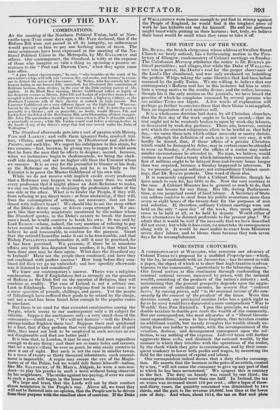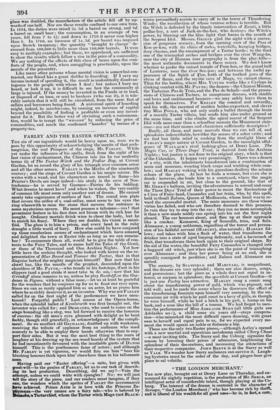WORCESTER CROTCHETS.
A CORRESPONDENT at Worcester, who censures our advocacy of Colonel TORRENS'S proposal for a modified Property-tax—which, by the by, lie confounds with an income-tax—has favoured us with a paper, the object of which is to show that high taxation is advan- tageous to the community, "particularly to the labouring classes." Our friend arrives at this conclusion through confounding the nominal national income, measured by prices, with the national wealth, consisting of the products of the nation's industry ; and, maintaining that the general prosperity depends upon the aggre- gate amount of individual incomes, lie asserts that "indirect taxes," by raising prices, add "to the nominal income of the com- munity by the amount of the produce.' of the taxes. Were this doctrine sound, our provincial monitor (who has a quick sight as far as he sees) would have discovered a more compendious "Way to Wealth" than Poor Richard's. Upon this principle, we need only double taxation to double pro tanto the wealth of the community. But our correspondent, like most advocates of a "liberal Govern- ment expenditure," seems to have forgotten, that taxation creates no additional wealth, but merely transfers the wealth already ex- isting from one holder to another, with the accompaniment of the vexation, distress, and derangement consequent upon the cols lection, to say nothing of the expense. Indirect taxes still further aggravate these evils, and diminish the national wealth, by the manner in which they interfere with the operations of the trader, by the check which they give to consumption, and by their conse- quent tendency to lower both profits and wages, by narrowing the field for the employment of capital and labour. Our correspondent indeed denies that a duty checks constimpf tion. He asserts that the increase in the price of an article, created by a tax, " will not cause the consumer to give up any part of that to which he has been accustoined." We suspect this is contrary to the fact. The duty on brandy was raised by one third ; the consumption diMinished more than one half. In Ireland, the tax on wines was increased about 150 per cent. ; after a lapse of three- and-thirty years, the quantity consumed was diminished by two thirds, and the gain to the revenue 20,0001. less than at the lower rate of duty. And when, about 1814, the tax on flint and plate glass was doubled, the manufactare of the article fell off by up- wards of one half. Nor are these results confined to our own time. In 1694, the duties were raised 2s. 3d. a barrel on strong, and 9d. a barrel on small beer ; the consumption, in an average of ten years, fell from 7 to 521; and down to 1750 it never rose higher than 6. In 1760, an increase of ls. 3d. per barrel was imposed upon Scotch twopenny; the quantity "brought to charge" de- creased from 500,000 to little more than 100,000 barrels. It were easy to multiply examples; but these, we apprehend, are sufficient to show the results which follow a rise in the price of a commodity. We say nothing of the effects of this class of taxes upon the com- forts of the people, and, when smuggling is practicable, upon the morals of the peasantry. Like many other persons whose mental vision is somewhat con- tracted, our friend has a great dislike to hoarding. If I save my income instead of spending it, the result is undoubtedly disadvan- tageous to the people with whom I deal ; but unless I bury my hoard, or lock it up, it is difficult to see how the community at large is injured. If the money be invested in the Funds or in land, or disposed of on loan, or sent to bankers (who use it), it is tole- rably certain that it will still be circulated, from the mere fact of sellers and borrowers being found. A universal spirit of hoarding might, indeed, be mischievous, by causing an increase of capital beyond the possibility of finding a profitable or even any invest- ment for it. But the better way of obviating such a consumma- tion, would be to tempt the "waverer" by reducing the price of commodities, and reach the confirmed "hoarder" by means of a property-tax.



























 Previous page
Previous page